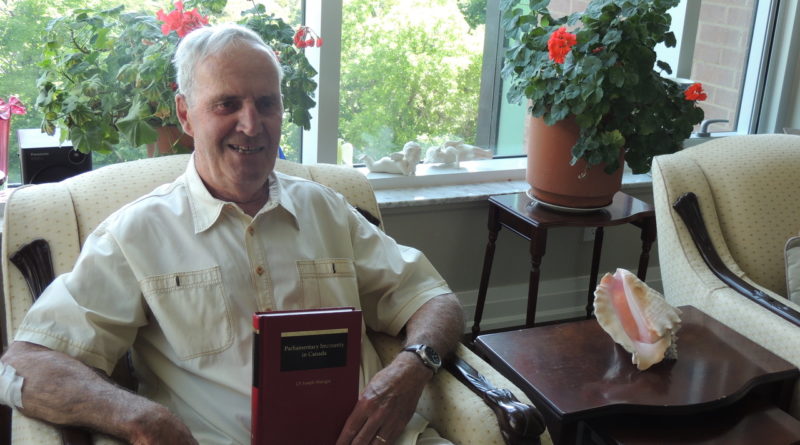Joseph Maingot’s book on parliamentary privileges
Yves LeBouthillier
As to be expected in a community so proximate to Parliament Hill, there are a number of Sandy Hill residents who have spent a large part of their lives working either for individual MPs, federal political parties, the House of Commons or the Senate. In doing so, some have become experts on important topics related to our parliamentary political system.
Joseph Maingot falls squarely within that category. He has published a number of books and papers on a key feature of our representative system, namely parliamentary privilege and immunity.
Maingot’s latest offerng, Parliamentary Immunity in Canada, was published by LexisNexis in 2016. In this book, he draws on the vast knowledge he acquired during the many years he worked as Law Clerk and Parliamentary Counsel to the House of Commons.
This topic is a core feature of our democratic system. Parliamentary immunity is essential to ensure that parliamentarians speak their minds freely when addressing any issue in the House of Commons or in the Senate. As the author reminds us, this protection, which goes back to article 9 of the British Bill of Rights adopted in 1689, is “not so much intended to protect the Members for their own individual advantage, but to support the rights of the people by enabling their representatives to execute the functions of their office without fear of either civil or criminal law prosecutions.” In addition to freedom of speech, the study of parliamentary privilege and immunity includes “breaches of privileges and contempts, debates and proceeding in Parliament as evidence in court, privilege of freedom from arrest, and related privileges.”
There is much to discover and ponder in this detailed study: the long history of parliamentary immunity from its emergence and continuous development in England to its transposition into the Canadian parliamentary system; the scope of this immunity in civil and criminal law matters; the basis for the Houses to control the publications of debates; pronouncements in and outside the House; protection offered to actors other than members of Parliament; the meaning of the term “proceedings”; the protection enjoyed by parliamentary committees; the difference between parliamentary privilege and protection by the common law. The list goes on as the author delivers a very complete coverage of the subject. For instance, he explains why the court looks differently at the publication in full of a parliamentary debate versus portions of a single speech that could be defamatory toward an individual. In doing so he relies on key judicial decisions of course. These cases, from both the UK and Canada, have resolved important questions and, in some cases, have prompted legislative response.
As the author mentions early on, his book focuses on the immunities, privileges and powers of the Houses of Parliament (Commons and Senate), but it also provides learned comments on such matters arising from provincial and territorial legislatures. Usefully, the author ends each chapter with a summary of the main questions he addressed. A number of key documents are also included in annexes at the end of the book.
In sum, Joseph Maingot’s book is an in-depth examination of key protections needed to ensure that our parliamentary institutions remain hallmarks of our democratic system.
